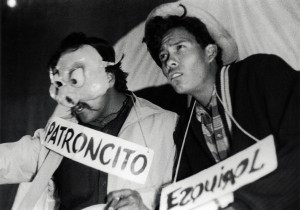 El Teatro Campesino: the Farmworker’s Theater
El Teatro Campesino: the Farmworker’s Theater
By Cathleen Miller
At San José State Luis Valdez studied the theatre arts, examining the works of the ancient Greeks, the Romans, then moving forward to Bertolt Brecht and the concept of exploring the theatre as a forum for political ideas. Valdez also discovered el teatro campesino (the farmworker’s or peasant’s theatre), popular during the Mexican Revolution. These short, one-act plays were designed to instruct and inspire an uneducated population.
After graduation, the SJSU alumnus created El Teatro Campesino, which was born on the picket lines of the Great Delano Grape Strike in 1965. While working with United Farmworkers Union leader César Chávez, “the company created and performed actos, or short skits, on flatbed trucks and in union halls, taking the actos on tour to dramatize the plight and cause of the farmworkers.”
From these authentic roots, El Teatro Campesino has grown to be the preeminent Latino theatrical company in America. In 1971, the company moved permanently to San Juan Bautista. El Teatro Campesino has won many awards over the years including an Obie, an Emmy, a Peabody Award (for excellence in public television), thirteen Bay Area Drama Critics Awards, and numerous Los Angeles Drama Critics Awards.
El Teatro Campesino now is engaged in developing works for the next generation. But for founding artistic director Luis Valdez, the collaborations remain very much a family affair, as he joins with Lupe, his wife of 45 years, who writes and designs costumes, and their sons, Anahuac, Kinan, and Lakin, all of whom write, produce, act, and direct for the stage as well as film.
The whole clan has participated in the creation of Valley of the Heart, a play Valdez says was influenced by the work of two other SJSU alumni: Jeanne Wakatsuki Houston and her husband, James Houston, authors of Farewell to Manzanar. Valley mines California’s history and also that of Valdez when his family settled on a farm that the government had seized from a Japanese family during their internment in World War II. “I wanted to capture the multicultural fabric of life in this state,” he notes. (Rumor has it that a San José production of Valley of the Heart is in the works.)
For decades, Luis Valdez has modeled the advice he offers today’s students: “Be prepared to create your own job. Use your ingenuity, creativity, stick-to-itiveness. It’s never a mistake to do art. What makes us human is our ability to create, and art enhances our ability to communicate, to create compassion,” he says, describing the very traits that have symbolized his career and that also embody the creativity, motivation, and innovation that the College of Humanities and the Arts strives to instill in all students.


